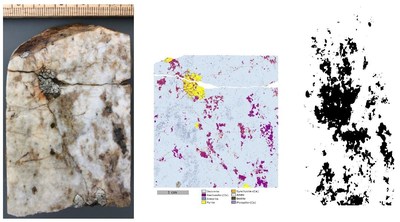Defense Metals X-Ray Transmission Amenability Study Demonstrates Potential For Sensor Based Upgrading Of Wicheeda Rare Earth Element Feed
Defense Metals Corp. has released results from an X-Ray Transmission (XRT) amenability study on the Wicheeda Rare Earth Element property, confirming the potential for low-cost upgrading of REE minerals. The study shows that XRT technology can enhance REE mineral content from approximately 11% to 25%. With indicated resources of 4.89 million tonnes averaging 3.02% LREO and inferred resources of 12.1 million tonnes averaging 2.90% LREO, this development signifies potential cost efficiencies in the mineral processing stage and improved downstream benefits.
- XRT technology can enhance REE mineral content from approximately 11% to 25%.
- Indicated resources of 4.89 million tonnes averaging 3.02% LREO.
- Inferred resources of 12.1 million tonnes averaging 2.90% LREO.
- Potential for reduced costs related to reagent reduction due to upgraded concentrate quality.
- None.
VANCOUVER, BC, March 9, 2021 /PRNewswire/ - Defense Metals Corp. ("Defense Metals") (TSXV: DEFN) (OTCQB: DFMT) (FSE: 35D) is pleased to announce that it has received the results of an X-Ray Transmission amenability study completed on samples of Wicheeda Rare Earth Element (REE) mineralized drill core by the Saskatchewan Research Council (SRC), Saskatoon, SK.
The road accessible Wicheeda REE Property is located close to infrastructure approximately 80 kilometres northeast of Prince George, British Columbia (BC).The Wicheeda project has indicated mineral resources of 4,890,000 tonnes averaging
Highlights of the XRT amenability study completed by SRC on samples of high-grade REE mineralized Wicheeda diamond drill core are as follows:
- X-ray transmission measurements and QEMSCAN® confirmed that XRT technology can identify Wicheeda REE minerals in drill core samples (Figure 1).
- Crushingto-15mmsize particlesandusinga5% REE mineral lower cut-offinthesortingalgorithm,demonstrated the potential of low-cost front end XRT sorting to upgrade 2.3xfromapproximately
11% REEmineral contentto25% REEmineralcontent. - Upgrading of Wicheeda REE mineralization via XRT sorting has the potential to significantly reduce feed volume forwarded to downstream the hydrometallurgical process.
Craig Taylor, CEO of Defense Metals, stated: "Defense Metals is excited to establish the amenability of Wicheeda REE mineralization to the application of low-cost front end upgrading via sensor-based sorting technologies. We know from our very successful flotation pilot plant and bench-scale hydrometallurgical test-work that early volume reduction and upgrading has significant downstream benefits. The quality of concentrate we can deliver to flotation process has direct benefits in terms of process recovery, and reduced costs related to reagent reduction. Based on the success of this amenability test work SRC have recommended proceeding to a series of confirmatory XRT sorting optimization tests."
Table 1. Theoretical Grade of XRT Sorted Mineralized Feed At Various Particle Sizes
Potential REE Mineral Grade with Barren Particles Removed | Potential REE Upgrade Using Various Lower Cut-Offs | |||||||||
Preferred Sorting Technology | Particle | Mineral | Particles with REE's | Minerals | Accept | REE Cut-Off (%) | Minerals | REE Minerals Recovered (%) | Accept | Reject |
XRT | 20 mm | 57 | 57 | |||||||
10 mm | 226 | 222 | ||||||||
6 mm | 625 | 586 | ||||||||
DMS | 3 mm | 2,450 | 1,916 | |||||||
1.2 mm | 14,894 | 7,275 | ||||||||
0.6 mm | 59,199 | 17,406 | ||||||||
XRT sorting is a technology that exploits the atomic density (atoms/cm3) differences of minerals. The atomic density of a mineral is closely related to the minerals' density (gram/cm3) and is therefore a viable technology for upgrading the mineralized feed prior to processing. Previous test work indicated that gravity separation prior to flotation was beneficial in concentrating Wicheeda REE minerals due to the large density differences between the REE and gangue minerals.
To evaluate amenability to XRT sorting, a combination of high-resolution XRT and QEMSCAN® (Quantitative Evaluation of Materials by Scanning Electron Microscopy) measurements were carried out at the SRC. These measurements identify if the atomic density differences between the REE and gangue minerals can be exploited for XRT sorting. The greyscale levels associated with the various minerals are identified using QEMSCAN® measurements.
Using the X-ray greyscale images and the QEMSCAN® images, additional theoretical information on the grade of the REE minerals for various particle sizes is generated. The particle grade information determined how much gangue and how much REE mineralization is present in each size fraction. Information is necessary to determine the benefits of upgrading the mineralized feed at different particle sizes.
Size fractions greater than 6 mm can be viably sorted using XRT sorters while size fractions greater than 0.6 mm are more amendable to sorting using dense medium separation (DMS) and spirals. Size fractions less than 0.6 mm are concentrated via hydrometallurgy processes. The average distribution of the REE minerals and the theoretical grade of the XRT sorted mineralized feed for the six core samples, for each size fraction within 20 mm, 10 mm, and 6 mm particles are shown in Table 1.
About the Wicheeda REE Property
The 1,708 hectare Wicheeda REE Property, located approximately 80 km northeast of the city of Prince George, British Columbia, is readily accessible by all-weather gravel roads and is nearby to infrastructure, including power transmission lines, the CN railway and major highways.
Geologically, the property is situated in the Foreland Belt and within the Rocky Mountain Trench, a major continental geologic feature. The Foreland Belt contains part of a large alkaline igneous province, stretching from the Canadian Cordillera to the southwestern United States, which includes several carbonatite and alkaline intrusive complexes hosting the Aley (niobium), Rock Canyon (REE), and Wicheeda (REE) deposits.
Qualified Person
The scientific and technical information contained in this news release as it relates to the Wicheeda REE Property has been reviewed and approved by Kristopher J. Raffle, P.Geo. (BC) Principal and Consultant of APEX Geoscience Ltd. of Edmonton, AB, a director of Defense Metals and a "Qualified Person" as defined in National Instrument 43-101 – Standards of Disclosure for Mineral Projects. Mr. Raffle verified the data disclosed which includes a review of the analytical and test data underlying the information and opinions contained therein.
Methodology and QA/QC
A total of 6 core samples were selected for X-ray transmission measurements. Each sample was imaged using 2-dimensional X-ray transmission measurements to identify greyscale differences in the core samples. The greyscale levels associated with the various minerals are identified using QEMSCAN® measurements. The X-ray images are then modified using a defined threshold to identify the location and dispersion of the REE minerals and pyrite throughout the core samples. The results of this XRT amenability study are theoretical in nature and may not be representative of actual recoveries obtainable via direct testing using XRT sorting and DMS.
Using image analysis techniques on the QEMSCAN® images, the percent removal of low-grade mineralization is calculated for different theoretical size fractions. The size fractions used in this study were: 20 mm, 10 mm, 6 mm, 3 mm, 1.2 mm, and 0.6 mm rectangular particles.
Defense Metals is not aware of any drilling, sampling, recovery, or other factors that could materially affect the accuracy or reliability of the data referred to herein. The SRC operates in accordance with ISO/IEC 17025:2005 (CAN-P-4E), General Requirements for the Competence of Mineral Testing and Calibration Laboratories. SRC is independent of Defense Metals Corp. and the Qualified Person.
About Defense Metals Corp.
Defense Metals Corp. is a mineral exploration company focused on the acquisition of mineral deposits containing metals and elements commonly used in the electric power market, military, national security and the production of "GREEN" energy technologies, such as, high strength alloys and rare earth magnets. Defense Metals has an option to acquire
Neither the TSX Venture Exchange nor its Regulation Services Provider (as that term is defined in the policies of the TSX Venture Exchange) accepts responsibility for the adequacy or accuracy of this news release.
Cautionary Statement Regarding "Forward-Looking" Information
This news release contains "forward–looking information or statements" within the meaning of applicable securities laws, which may include, without limitation, statements relating to proceeding to a series of confirmatory XRT sorting optimization tests and the expected, plans for the Wicheeda Property, the advancement and development of the Wicheeda Property, the technical, financial and business prospects of the Company, its project and other matters. All statements in this news release, other than statements of historical facts, that address events or developments that the Company expects to occur, are forward-looking statements. Although the Company believes the expectations expressed in such forward-looking statements are based on reasonable assumptions, such statements are not guarantees of future performance and actual results may differ materially from those in the forward-looking statements. Such statements and information are based on numerous assumptions regarding present and future business strategies and the environment in which the Company will operate in the future, including the price of rare earth elements, the ability to achieve its goals, that general business and economic conditions will not change in a material adverse manner, that financing will be available if and when needed and on reasonable terms. Such forward-looking information reflects the Company's views with respect to future events and is subject to risks, uncertainties and assumptions, including those filed under the Company's profile on SEDAR at www.sedar.com. While such estimates and assumptions are considered reasonable by the management of the Company, they are inherently subject to significant business, economic, competitive and regulatory uncertainties and risks. Factors that could cause actual results to differ materially from those in forward looking statements include, but are not limited to, continued availability of capital and financing and general economic, market or business conditions, adverse weather conditions, failure to maintain or obtain all necessary government permits, approvals and authorizations, failure to maintain community acceptance (including First Nations), decrease in the price of rare earth elements, the impact of Covid-19 or other viruses and diseases on the Company's ability to operate increase in costs, litigation, and failure of counterparties to perform their contractual obligations. The Company does not undertake to update forward–looking statements or forward–looking information, except as required by law.
______________________________ |
1Technical Report on the Wicheeda Property, British Columbia, effective June 27, 2020 and prepared by APEX Geoscience Ltd. (Steven J. Nicholls, B.A. Sc., MAIG and Kristopher J. Raffle, B.Sc., P.Geo.) is available under Defense Metals Corp.'s profile on SEDAR (www.sedar.com) |
![]() View original content to download multimedia:http://www.prnewswire.com/news-releases/defense-metals-x-ray-transmission-amenability-study-demonstrates-potential-for-sensor-based-upgrading-of-wicheeda-rare-earth-element-feed-301242744.html
View original content to download multimedia:http://www.prnewswire.com/news-releases/defense-metals-x-ray-transmission-amenability-study-demonstrates-potential-for-sensor-based-upgrading-of-wicheeda-rare-earth-element-feed-301242744.html
SOURCE Defense Metals Corp.
FAQ
What are the results of the X-Ray Transmission study by Defense Metals Corp.?
How much REE mineral resources does the Wicheeda project have?
What is the significance of the XRT amenability study for Defense Metals Corp.?
When was the X-Ray Transmission study conducted?









